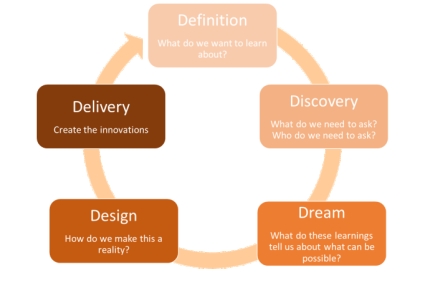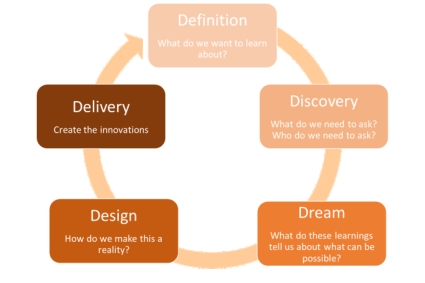Appreciative Inquiry: Discovery
“If I had an hour to solve a problem and my life depended on the solution, I would spend the first 55 minutes determining the proper question to ask, for once I know the proper question, I could solve the problem in less than five minutes”. (Albert Einstein)[1]
Appreciative Inquiry is a practice that focuses on what’s working, plus understanding why it works and how to do more of what works. Rather than focusing on the problem, or deficit, we imagine where we want to be and move in that direction using a positive emphasis.
The Five D’s of Appreciative Inquiry illustrate the thought process for implementing this approach. I covered the Definition step in the July 17, 2019 post. The next step, Discovery, is about answering the critical questions identified in the Definition step. And this is the most important part of this phase – there is no statistical sampling. The idea is to involve as many stakeholders as possible from within and outside of an organization. A key idea of Appreciative Inquiry is that the process of the positive inquiry is as important as the information collected. This is the foundation of Appreciative Inquiry – the act of participation leads to a shared focus on moving toward a positive future outcome.

So how can this work for energy conservation, for carbon reduction, for addressing climate change? Is it about how we frame the questions as much as the questions we ask? If the goal is to include as many as possible in the assessment, in the discovery, how do we ensure openness to the process from those with whom we find it easy to agree as well as with those with whom we passionately disagree?
In his blog post, Think local. Act local. Be apolitical. Appreciative inquiry and sustainable communities[2], Ray Wells highlights a community rating system called STAR – Sustainability Tools for Assessing and Rating communities[3]. This assessment tool includes seven categories: 1) the built environment, 2) climate and energy, 3) the economy and jobs, 4) education, arts and community, 5) equity and empowerment, 6) health and safety, and 7) natural systems.
His community is coupling the STAR Framework with Appreciative Inquiry to bring together community members to “institutionalize STAR sustainability practices throughout the community.” I would expect this inclusive list of topics provides opportunity for many to find common ground, and facilitates a positive conversation that invites and supports progress across each of the seven STAR categories. I will investigate and report back!
In the Next Issue
In the next few posts, we will continue to explore how Appreciative Inquiry might be a vital component for shifting how, when, why, and where energy is used by diving more deeply into the Five D’s. I would love to hear from others!
[1] Find this, and other inspiring quotes here: “Words of Wisdom…Quotes That Lead In New Directions”, https://www.ndcollaborative.com/quotes-2013/
[2] Ray Wells, Think local. Act local. Be apolitical. Appreciative inquiry and sustainable communities, January 30, 2017, https://positivechange.org/think-local-act-local-be-apolitical-appreciative-inquiry-and-sustainable-communities/
[3] You can download the STAR Rating System for free here: http://www.starcommunities.org/get-started/download/
About This Blog
We are on the brink of an evaluation renaissance. Smart grids, smart meters, smart buildings, and smart data are prominent themes in the industry lexicon. Smarter evaluation and research must follow. To explore this evaluation renaissance, I am looking both inside and outside the evaluation community in a search for fresh ideas, new methods, and novel twists on old methods. I am looking to others for their thoughts and experiences for advancing the evaluation and research practice.
So, please…stay tuned, engage, and always, always question. Let’s get smarter together.

